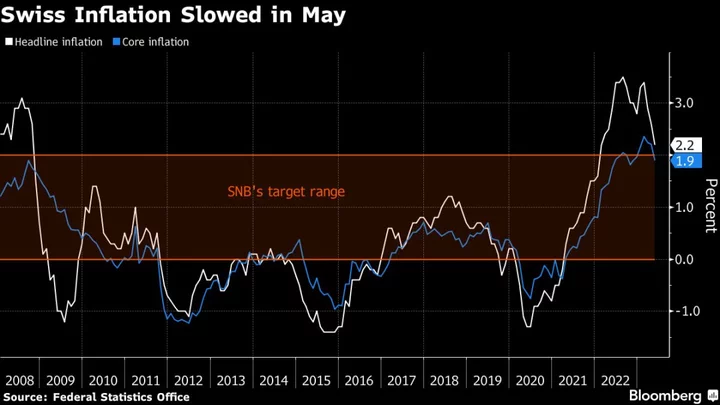A measure of underlying inflation in Switzerland slowed more than expected to below the central bank’s ceiling, giving comfort to officials trying to ensure consumer prices stay under control.
The so-called core gauge, which strips out volatile elements like energy and food, fell to 1.9% in May, down from 2.2% the previous month. Headline inflation also slowed markedly, coming in at 2.2%, matching the median estimate in a Bloomberg survey.
On the month, overall prices increased 0.3% because of higher costs for housing rentals, package holidays and several food products. Air transport, holiday home accommodation, heating oil and diesel all produced a downward effect.
“The year-on-year figure of 2.2% confirms that a return to price stability in Switzerland by the end of the year is achievable,” said Oddo BHF economist Jurus Arthur.
This is the last reading of inflation before Swiss National Bank officials meet for their quarterly interest-rate decision on June 22. Economists predict a further 25 basis-point hike from the current level of 1.5%.
Karsten Junius, chief economist at Bank J Safra Sarasin Ltd, said it is “paritcularly encouraing” that how services inflation remains below 2%, an input that accounts for more than half of the Swiss consumer-price basket.
“This indicates only moderate wage pressure and that second-round effects of last year’s inflationary push are not as strong as in most other countries,” Junius said. “The SNB will therefore not have to raise its key rates as sharply as in the euro area.”
Receding price pressures have seen the SNB’s main concern shift from headline inflation to increases spreading through the economy.
President Thomas Jordan said last week that the central bank cannot tolerate underlying consumer-price increases to stay above 2% for too long.
“If inflation stays elevated for some time, then the behavior of firms and households with respect to price setting changes — inflation is accepted,” he said.
Officials’ worries mounted after the recent rising of a benchmark for mortgage costs, which is set to trigger widespread rent increases. Economists have warned that SNB’s tightening campaign — which drives credit costs — might itself fan inflation through this channel.
The central bank’s forecast sees headline inflation at or above its target’s ceiling of 2% through 2025, which signals further borrowing-cost increases. Still, Swiss consumer-price growth remains the slowest of all developed economies.
EXPLAINER: How Switzerland Dodged the Worst of the Global Inflation Shock
Based on the European Union’s harmonized measure, it stood at 2.2% in May — that is less than half the pace in the surrounding euro area, where price pressures have so far receded slower from their peak than in Switzerland.
--With assistance from Joel Rinneby and Kristian Siedenburg.
(Updates with economist comments starting in fourth paragraph)

